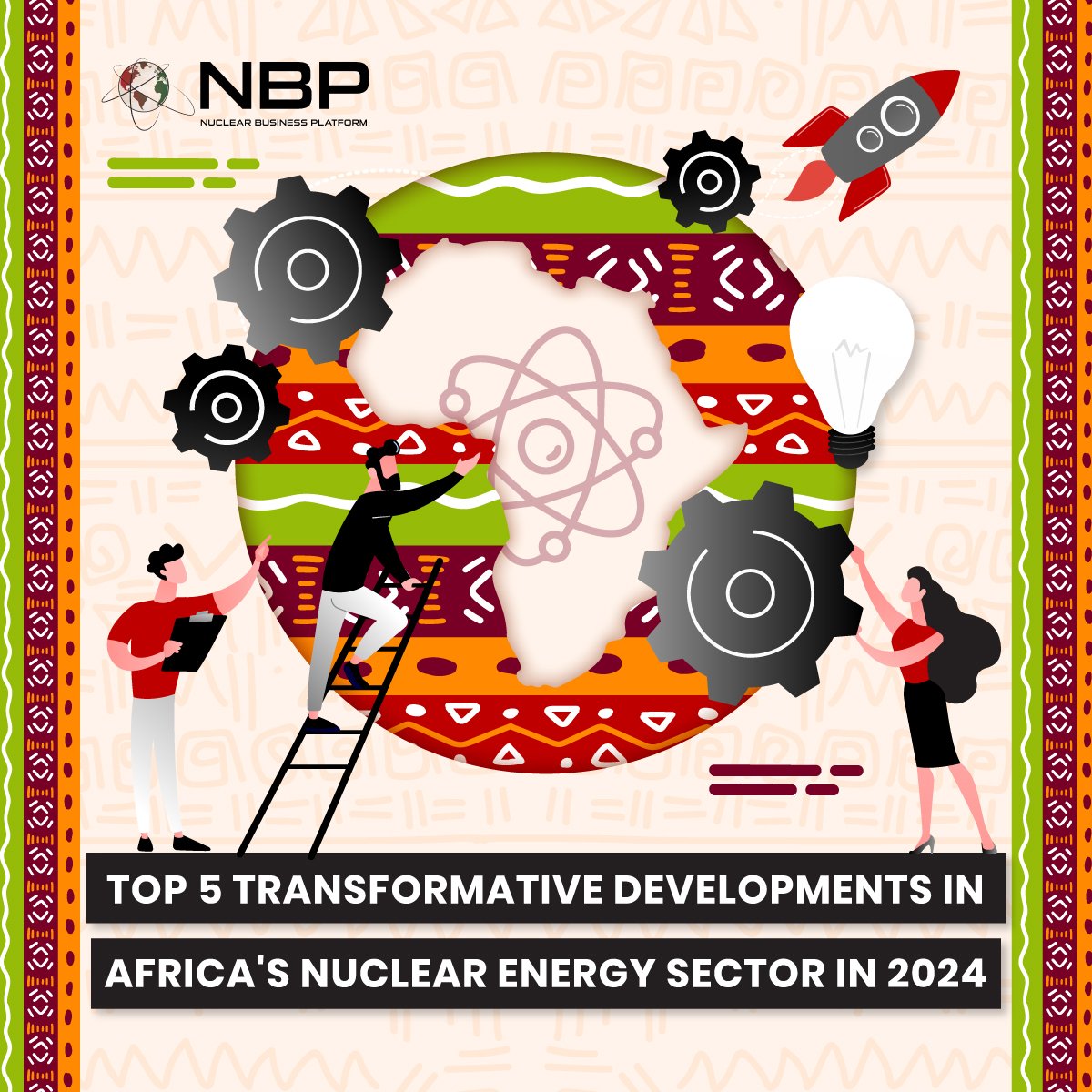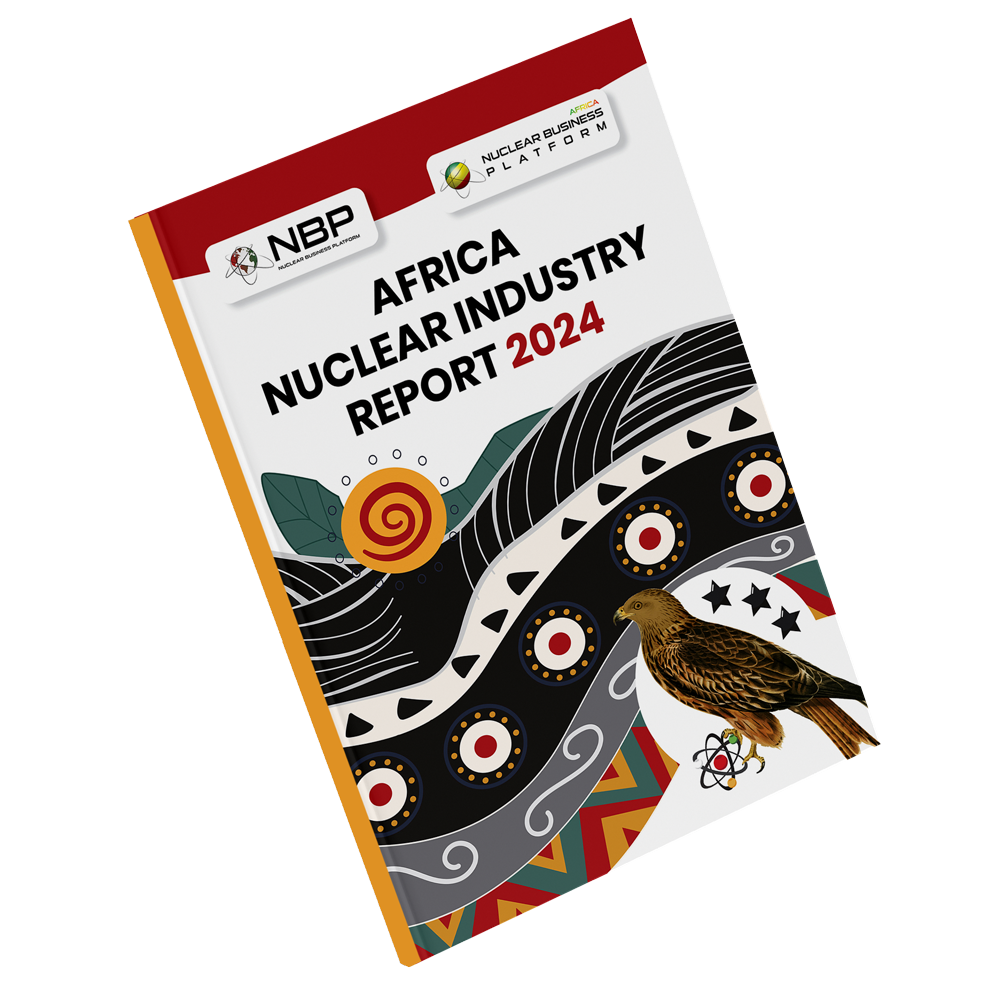Top 5 Transformative Developments in Africa's Nuclear Energy Sector in 2024
The year 2024 has been a defining chapter in Africa’s nuclear energy journey, showcasing unprecedented advancements in reactor technology, workforce development, infrastructure expansion, and international partnerships. These steps underline Africa's commitment to leveraging nuclear energy as a cornerstone for sustainable growth, energy security, and climate resilience. Below, we explore the most transformative milestones shaping the continent’s nuclear energy landscape this year.
1. Pioneering Small Modular Reactors (SMRs): A New Era for Nuclear Technology
Africa's nuclear energy future is being redefined by the deployment of Small Modular Reactors (SMRs). Ghana has witnessed a busy 2024 year regarding integrating nuclear energy into its energy mix, signing multiple landmark agreements and MoUs. Ghana took a historic step by signing an agreement with the U.S.-based Regnum Technology to deploy NuScale’s VOYGR-12 SMR. This partnership positions Ghana as the first African nation to host this groundbreaking technology. Beyond energy generation, the initiative includes plans for a nuclear supply chain and job creation, making Ghana a leader in Africa’s SMR revolution. A defining moment came during the Africa Nuclear Business Platform (AFNBP) 2024, where Ghana secured plans to establish Africa's first NuScale Energy Exploration (E2) Center at the Ghana Atomic Energy Commission (GAEC). This state-of-the-art facility will train nuclear operators and engineers, cementing Ghana's role as a regional hub for SMR technology. Additionally, Ghana renewed technical agreements with Japan and the United States. South Africa also made significant progress in SMR development through the HTMR-100 project, securing a ZAR 9 billion ($480 million) financing deal with Koya Capital and Stratek Global. Minister of Energy Kgosientsho Ramokgopa emphasized SMRs’ potential to enhance energy security and environmental sustainability, reaffirming South Africa’s leadership in advancing innovative nuclear solutions. In November, South Africa advanced its nuclear ambitions through an MoU signed by South African Nuclear Energy Corporation (Necsa), the isotope production company Aerodynamic Separation Process Isotopes (ASPI), and Korea Electric Power Corporation (Kepco). This pivotal agreement seeks to establish South Africa as a global leader in nuclear technology while enhancing and expanding the contribution of nuclear energy to the nation’s energy mix. Minister Kgosientsho Ramokgopa underscored the agreement's significance, stating that it serves as a catalyst for industrial development by driving investment, fostering partnerships, and bolstering research and innovation capabilities.Rwanda joined the SMR movement by partnering with Nano Nuclear Energy and Dual Fluid Energy to introduce modular reactors and an experimental design, showcasing the nation's ambition to integrate cutting-edge nuclear technologies. Similarly, in December, NANO Nuclear Energy formalized an MoU with the Republic of Togo to explore the integration of nuclear energy as a cornerstone for sustainable development in the West African nation. Under this agreement, the Togolese government will provide support for NANO Nuclear’s licensing and implementation initiatives, demonstrating a shared commitment to advancing nuclear energy solutions for the country’s development goals.
2. Workforce Development and Capacity Building: Laying the Human Foundations
A skilled workforce is critical for the success of Africa’s nuclear ambitions, and 2024 witnessed groundbreaking initiatives in this domain. Ghana emerged as a hub for nuclear education with the launch of Africa’s first Regional Clean Energy Training Centre, developed in partnership with the U.S. Department of Energy and the Ghana Atomic Energy Commission (GAEC). This facility is designed to equip engineers and technicians across Africa with the expertise needed to manage nuclear projects.In tandem, Ghana hosted the Africa Nuclear Business Platform (AFNBP) in Accra, signing agreements to establish the continent's first NuScale Energy Exploration (E2) Center and a Regional Welding Certification Program under the U.S. FIRST program. These initiatives aim to integrate Ghana into global SMR supply chains while strengthening regional capabilities.Meanwhile, Rwanda expanded its nuclear education pipeline by sending hundreds of students to Russian universities. Discussions with Rosatom to develop a nuclear science center and small power plant further underscore Rwanda’s commitment to workforce development.
3. Advancing Reactor Development: Scaling Up Capacity
Large-scale reactor projects also made headlines. Ghana entered a partnership with CNNC Overseas Limited to develop a Hualong One (HPR-1000) nuclear power project, marking a milestone in its energy transition. This collaboration, unveiled at the 26th World Energy Congress in Rotterdam, includes plans to modernize Ghana's energy grid to accommodate nuclear-generated power. Also, Ghana signed a recent MoU with EDF of France to explore EPR1200 reactor technology and capacity-building initiatives.South Africa extended the operational life of its Koeberg Nuclear Power Station's Unit I by 20 years and announced plans for a 2,500 MW nuclear project featuring SMRs. In Egypt, significant progress was reported at the El-Dabaa Nuclear Power Plant, with 30% of the project completed by year-end. In July 2024, The Egyptian Minister of Electricity and Renewable Energy, Mahmoud Esmat confirmed that “El-Dabaa NPP project is under constant supervision and that the work is ongoing on schedule to complete all stages and connect it to the grid”
4. Innovations in Fuel Production and Waste Management
Breakthroughs in nuclear fuel production and waste management were pivotal in 2024. South Africa strengthened its leadership in fuel production through an agreement between Necsa and ASP Isotopes to develop a cutting-edge nuclear fuel facility. This hub aims to serve high-temperature reactors globally, reinforcing South Africa's position in advanced nuclear fuel technology.Waste management also saw transformative advancements. South Africa’s AllWeld Nuclear and Industrial partnered with TVEL JSC, a subsidiary of Rosatom, to adopt innovative decommissioning technologies. Meanwhile, the African Commission on Nuclear Energy (AFCONE), in collaboration with DeepGeo, announced plans for regional deep geological repositories to safely store nuclear waste. These repositories are expected to bolster safety standards and create revenue streams to support further nuclear energy initiatives across Africa.
5. Strengthening International Partnerships: Building a Global Network
Africa's nuclear renaissance is anchored in robust international collaborations. At Atomexpo 2024 in Russia, Rosatom reaffirmed its commitment to supporting African nations with advanced nuclear technologies, including SMRs and floating power plants. Nigeria expanded its partnership with China, signing agreements to explore joint projects.Emerging players like Burkina Faso, Mali, and Guinea also made significant strides. Signing MoUs with Rosatom for nuclear power projects highlight the growing interest in nuclear energy across the continent. This December, Rosatom has signed an agreement with Ethiopia’s Ministry of Innovation and Technology to commence work on a Centre for Nuclear Science and Technology, The COP29 summit in Baku, Azerbaijan, solidified Africa’s nuclear aspirations, with nations such as Ghana, Morocco, Kenya, and Nigeria endorsing the Declaration to Triple Nuclear Energy by 2050.
Africa’s Nuclear Energy Renaissance
The momentum achieved in 2024 reflects Africa’s growing commitment to nuclear energy as a sustainable solution to its energy and economic challenges. According to the Nuclear Business Platform, the continent is on track to achieve 15 GW of nuclear capacity by 2035, signaling a pivotal role for nuclear in meeting Africa’s energy needs and climate goals.Countries like South Africa, Egypt, Ghana, Kenya and Nigeria are leading the charge, while Tier 2 and Tier 3 nations actively lay the groundwork for their nuclear aspirations. From advancing SMR deployment and workforce training to building large-scale reactors and fostering global partnerships, Africa is poised to emerge as a vital player in the global nuclear landscape. The achievements of 2024 set a robust foundation for the continent’s nuclear future, heralding an era of energy security, economic growth, and environmental sustainability.



